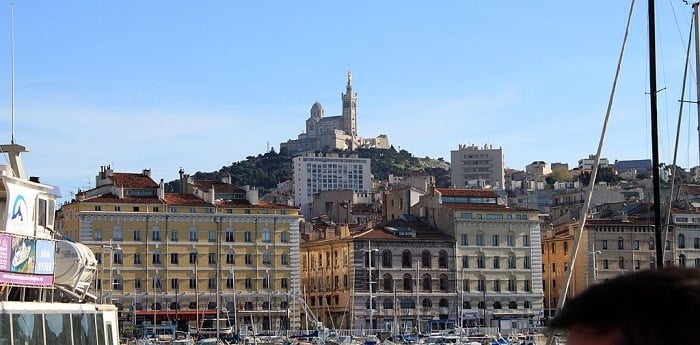
The huge port city of Marseille in southern France was founded by Greeks back in 600 BC when the first immigrants arrived in the area and established a trading colony.
The Greeks are well known for their ancient tales of glory and tragedy, as well as their civilization’s innumerable contributions to the very foundations of our modern world.
However, what is lesser-known is that throughout the centuries, they founded scores of cities across the Mediterranean which not only exist today but thrive and play a crucial role in their region’s affairs.
One of these cities is the huge port city of Marseille, the second-largest city in France and definitely among the oldest in Europe.
Thiere was at a time when many Phocaeans left their homeland in today’s Turkey (then Greek-speaking Asia Minor) and reached the northern shores of the Western Mediter-ranean.
They found a locale which could easily accommodate a large port and in a few years’ time, a new Greek colony had been established. Its name was ”ΜΑΣΣΑΛΙΑ” (”Massalia”).
The Greek myth of Marseille

The Greek philosopher, Aristotle, informs us about the myth concerning the foundation of Massalia.
According to this tale, Protis, the son of Euxenous from Phocaea, married Gyptis, the daughter of a King of a Celt tribe named Segobriges or Segusiavi, who lived in Gaul, ancient France.
This marriage was the beginning of the story of Marseille.
When the Greek man married this rich and beautiful Celtic woman, the local King gave him the right to obtain a piece of land and build his town.
This small settlement was the foundation of what was to become the well-known city of Massalia.
The greater Mediterranean region, ca. 800-550 BC
However, this well-known legend may have been disproven since, according to archaeological evidence, the Phocaeans were not the first Greeks to arrive on the northern shores of the western Mediterranean Sea.
The entire coastal region comprised of the modern regions of Catalonia, Spain, and France had seen the arrival of many Ionian Greeks before that time during their expeditions to the West to find new places to live and people with whom to trade.
Nonetheless, the city of Massalia itself was indeed established by Phocaeans, as they were the first to permanently settle there.
These first Greek settlers of the port city very quickly established a wide network of trade relationships with neighboring cities not only along the coast but also into the French mainland areas where various Celtic tribes once lived.
Other neighboring Greek colonies
The “Massaliotes,” as the Greeks of Marseille were known, first established good relations with other neighboring Greek colonies in the region beginning in the early stages of their colonization.
These colonies included the cities of Agde (Agathe Tyche, meaning ”Good Fortune”) in France; Antibes; Emporiae (the modern city of Empuries in Catalonia); Rhoda (the modern Roses in Catalonia); and, of course, the well-known cities of Nice (Nikaia) and Monaco, the modern-day cosmopolitan principality.
Prosperous traders
The outward-looking and trade-friendly attitude of the Greeks of Marseille offered their city the opportunity to expand economically, and as a consequence, to thrive and prosper.
Shipments of Greek produce constantly arrived at the region’s ports, and ancient Gaul was able to form a consistent, well-established network of communications and relations with the metropolitan areas of Greece via their colonies, especially Marseille.
During the following centuries, the people of Marseille continued to traded with the entire Mediterranean region, and the port grew in importance and size.
Consequently, a great deal of pottery, artwork, coins, and other objects from that period have been discovered all over France, from the southern to the very northern extremities of the country.
The Massaliotes as masters of trade
This active engagement with the entire region of Gaul made the Massaliotes the unchallenged masters of trade of the time.
Greek coinage was freely circulating across France, local Celtic tribes were using Greek themes to make their own coins, and the whole region was heavily influenced by the Greek settlers’ ”soft power” of commerce and trade.
Their influence even reached the shores of Britain, where local coins discovered in Kent and Surrey have depictions of Apollo. These coins are believed to have been influenced by the designs used in Marseille.
Of course, centuries later, the Romans arrived, other peoples and tribes made it to the shores of southern France, and history played out.
However, the distinctive Greek origins of Marseille have somehow managed to remain intact in the city’s psyche to this very day.
This is why Marseille is a city that, many centuries after its founding, still remains proud of its ancient roots which connect its people with the Greeks, the first original Marseillais.



